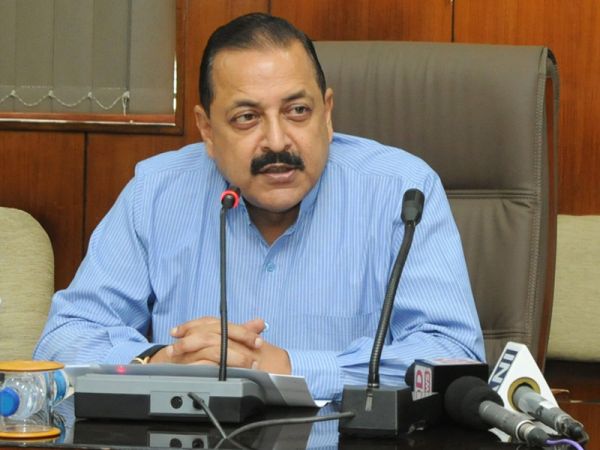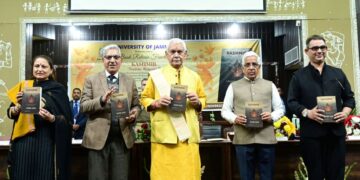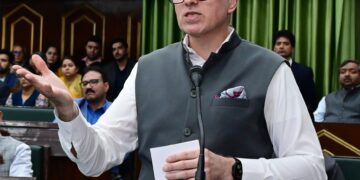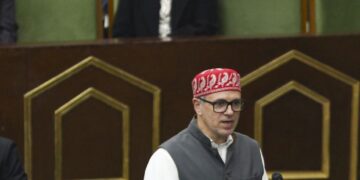Jammu: India under Prime Minister Narendra Modi’s leadership prioritises technology-driven progress in the healthcare sector, Union minister Jitendra Singh said on Sunday.
He reaffirmed the government’s commitment to completing 10 lakh genome sequencing in the coming years to enable more accurate disease prediction and personalised interventions.
Inaugurating the Centre for Advanced Genomics and Precision Medicine at AIIMS – Jammu, the Union Minister of state in the Prime Minister’s Office said the country was well on its way to leading the world in genomic health care.
“Under Modi’s leadership, India has prioritised technology-driven progress in the healthcare sector,” Singh said, citing the government’s efforts in promoting indigenous research and biotechnology.
He highlighted the exponential growth in India’s bio-economy — from USD 10 billion in 2014 to nearly USD 130 billion at present, with a target of USD 300 billion in the near future.
With more than 9,000 biotech start-ups compared to 50 in 2014, India is rapidly emerging as a global leader in medical innovation, he asserted.
“Gene therapy promises individualised management of disease for each patient. Even if two individuals suffer from the same condition — be it cancer, kidney disease, or any other ailment — the treatment could be different in each case, guided by the individual’s unique genetic makeup, pre-existing susceptibilities and inherited vulnerabilities,” the doctor-turned politician said.
Underscoring the transformative potential of gene therapy, the minister emphasised that, with genomic advancements, doctors would no longer rely on a one-size-fits-all approach but tailor treatments to maximise efficacy and specificity for each individual.
The new Centre for Advanced Genomics and Precision Medicine is among the frontrunners in India’s medical research landscape.
Set up in collaboration with 4-base Care, it aims to usher in a new era in personalised medicine, leveraging cutting-edge genomic research to provide targeted treatment based on individual genetic profiles.
By integrating genomic data with artificial intelligence-driven diagnostics, it aims to enhance early disease detection, optimise treatment strategies, and reduce the trial-and-error approach in medical prescriptions, experts at the centre said.
They said the facility would play a pivotal role in advancing precision oncology, cardiovascular genomics, and genetic screening for rare disorders.
Union minister Singh stressed the need for an India-specific genomic database, highlighting the country’s unique genetic diversity.
“India is a subcontinent in itself, with more than 4,600 distinct demographic groups. Our gene sequencing efforts, which have already mapped 10,000 healthy individuals across 99 communities, will help create a robust dataset tailored to Indian-specific health challenges,” he said.
Singh reaffirmed the government’s commitment to completing 10 lakh genome sequences in the coming years to enable more accurate disease prediction and personalised interventions.
He also pointed out the resurgence of infectious diseases alongside the rise in non-communicable diseases, urging a hybrid approach that combined traditional diagnostics with genetic insights.
He said a key objective of the centre was to make precision medicine affordable and accessible to the masses.
While personalised treatments have traditionally been costly, AIIMS – Jammu aims to leverage indigenous research and government-backed biotech initiatives to bring down costs and integrate precision medicine into public healthcare programmes, he said.
The minister highlighted initiatives such as Ayushman Bharat, which has provided health coverage to hundreds of thousands, and the recently launched Bio-E3 policy that focuses on biotechnology for economic growth, environmental sustainability, and employment generation.
“The government’s National Research Foundation (Anusandhan) will play a crucial role in funding next-generation research in genomics and personalised medicine,” he said.
Singh elaborated on how precision medicine could be a game-changer for cancer treatment, enabling doctors to design targeted therapies instead of relying solely on conventional chemotherapy and radiation.
He cited India’s recent success in conducting the first-ever genetic therapy trial for haemophilia at CMC Vellore where patients showed a 60 per cent improvement in clotting factor production, with zero bleeding episodes.
The trial results, acknowledged globally and published in the New England Journal of Medicine, underscored India’s rising stature in genetic research, he said and added genomic medicine would play a crucial role in tackling lifestyle diseases such as diabetes, now affecting younger age groups in India.
Singh said a recent study found that the prevalence of Type 2 diabetes in Jammu was slightly higher than the national average, making AIIMS – Jammu’s research even more critical in developing effective intervention strategies.
Singh reaffirmed the government’s vision of a Viksit Bharat by 2047, where health care was not only curative but also predictive and preventive.
“This is just the beginning. The future of medicine is personalised, and India is well on its way to leading the world in genomic healthcare,” he said.







